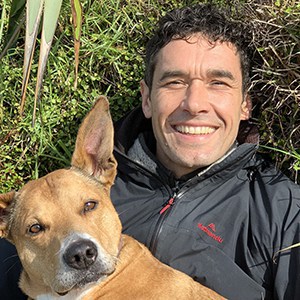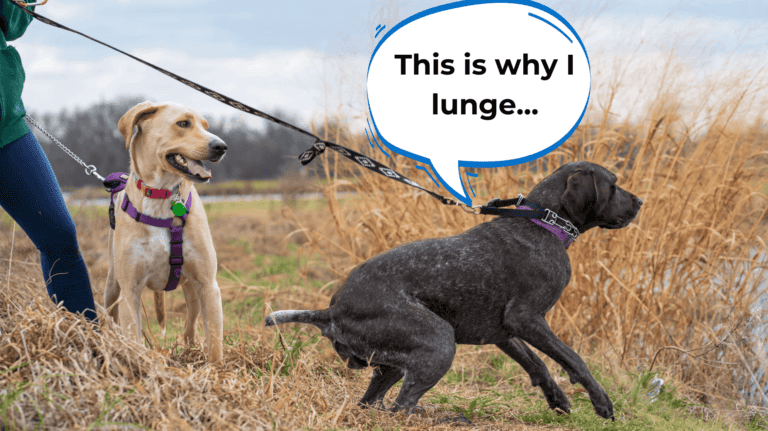The best age to adopt dogs is a serious factor to consider when getting a beloved canine companion! Let's look at all the factors involved, so you can MAKE THE RIGHT CHOICES…
JOIN MY FREE REACTIVITY CLASS
Unfortunately, according to a survey, 53.19% of dog owners who adopted find behavior issues.
That’s more than 50%!
Which breaks my heart because as a dog trainer, I know that within EVERY troublesome dog is a GOOD dog waiting to be understood.

Common issues include pet-owner mismatch, negative experiences of dogs, lack of training, or loving dog owner just getting tired of all the behavior problems.
Dog adoption is a great advocacy and I hope that more dog owners would make the RIGHT decision as to when to adopt a dog, or what dog to get.
This blog focuses on the BIGGEST questions you should ask before getting a dog.
What’s the best age to adopt dogs? Read on to learn more.
LEARN THE DOG CALMING CODE (FOR FREE)
Key Takeaways
- Adopting dogs should start with this question: which dog is compatible with my lifestyle, schedule, need, and capacity to train?
- Pet owner and dog mismatch can significantly affect your relationship in the long run. So, it’s important to take time when you’re in the process of deciding the best age to adopt dogs.
- The best age to adopt dogs is different for everyone. Some may find it easy to raise puppies, while some are totally okay with getting mature dogs.
Table of Contents
- Best Age to Adopt Dogs: Questions to Ask When Deciding to Adopt a Dog
- Best Age to Adopt Dogs: 3 Factors to Consider When Adopting Puppies and Older Dogs
- Best Age to Adopt Dogs: Cute Little Puppies (8-12 Weeks – Equivalent to Baby Stage)
- Best Time to Adopt Dogs: Curious Puppies (13 Weeks to 6 Months – Equivalent to Kindergarten/ Toddler Stage)
- The Best Age to Adopt Dogs: Juvenile Dogs (6 Months to 2 years – Equivalent to Child/ Teenage Years)
- Best Age to Adopt Dogs: Adopting Adult Dogs
- Best Age to Adopt Dogs: Mature Senior Dogs
- Best Age to Adopt Dogs: Are You Ready to Adopt a Dog Checklist
- Conclusion: The Best Age to Adopt Dogs? Look Into What You Really Need and Use It as a Guide
Best Age to Adopt Dogs: Questions to Ask When Deciding to Adopt a Dog
If you are thinking about adopting a dog, or what is the best age to adopt a puppy, you have probably thought about questions like “Do I need a dog or a puppy?”
I totally recommend that you go through the basic questions of dog adoption before making a decision when to adopt dogs.

Here are some questions about dog adoption every dog owner should ask.
Question #1: Should I Get a Puppy or a Rescue Dog?
Deciding between a puppy and a rescue dog depends on your lifestyle and preferences.
Puppies require more time, patience, and training, while older adopted rescue dogs offer the chance to give a second chance to a deserving companion.
Consider your commitment level, energy, and experience when making this choice.
Question #2: Do I Need a Puppy so I Can Form a Stronger Bond and Train Them Better?
Training your dog to good behavior doesn't solely start on the puppy stage.
Rescue dogs are equally capable of forming strong bonds based on trust and love.
Whether you choose a puppy or a rescue dog, investing time in training, socialization, and quality interactions will help develop lasting habits.
FREE REACTIVITY MASTERCLASS
Question #3: Should I Get a Puppy or Should I Rescue an Older Dog?
The decision between a puppy and an older dog depends on your lifestyle and preferences.
Unlike puppies, older dogs may be more settled and have established behaviors.

Consider your energy level, time availability, and willingness to handle the specific needs of each age group.
Question #4: Do I Need to Get a Puppy So I Can Form a Better Bond With Him?
Forming a strong bond with a dog isn't exclusive to puppies.
Dogs of any age can develop deep connections through consistent care, training, and affection.
Understanding their individual needs, providing a safe environment, and offering love and attention are key factors in building a strong bond, regardless of their age.
Question #5: Is This the Best Time in My Life to Adopt a Puppy?
Adopting a puppy requires careful consideration of your current circumstances. Puppies demand significant time, effort, and resources.

Evaluate factors such as your availability, financial stability, living situation, and personal commitments to determine if this is the right time to give a puppy the attention and care they need.
Question #6: Are My Family Members on Board with Me in Adopting a Puppy?
It's crucial to involve all family members in the decision to adopt a puppy.
Open communication and shared responsibility ensure that everyone is committed to the dog's well-being.
Discuss expectations, responsibilities, and the impact on daily routines to ensure a harmonious and supportive environment for the new addition.
Question #7: What Dog Age Fits My Lifestyle and Capacity to Care for Them?
Choosing the right dog age depends on your lifestyle and capacity to meet their needs.
Active individuals may enjoy the energy of a younger dog, while those seeking a more relaxed companion may find an older dog more suitable.

Consider your activity level, time availability, and ability to provide necessary care when deciding on the dog's age.
Question #8: Is My Home Ready to Become a Puppy Home?
Preparing your home for a puppy is essential to create a safe and welcoming environment.
Puppy-proofing involves removing potential hazards, securing breakable items, and setting boundaries. Ensure you have the necessary supplies, such as food, bedding, toys, and a designated space for them to rest and play comfortably.
GET MY 5 GOLDEN RULES FOR FREE!
Question #9: What Is the Best Age to Adopt Considering My Needs and Current Situation?
The best age to adopt a dog depends on your specific needs and current situation. Consider factors like your activity level, experience with dogs, available time for training, and compatibility with existing pets.
Assessing your lifestyle and expectations will help determine the age range that aligns best with your circumstances.
Best Age to Adopt Dogs: 3 Factors to Consider When Adopting Puppies and Older Dogs
After your love-at-first-sight moment at the pet store or puppy mill, and the rigorous paperwork, the reality of becoming an adoptive parent of a dog sets in.
Furparents who have bought my Puppy Coach program and the Dog Calming Code™ course collectively expressed surprise at the challenges that came right after they adopt a puppy. Some of the puppy and dog adoption sentiments I gathered through the years include:
“I never thought bigger puppies were so curious – just running and jumping all over the place!”
“We love our new baby puppy but all the very specific care, training, and pet insurance involved knocked us a bit sideways.”

“Dealing with an older dog is like dealing with a teenager! It’s a constant power struggle!”
I get you — you want to be a fur parent that is 100% committed to making the most out of your relationship with your new dog.
To get to a point where you enjoy having your new dog with you, making sure you’re a match matters.
To help you become a loving dog parent ready for the punches of dog ownership, here are some things to consider.
#1: Is Your Home Ready for The Dog of Your Choice?
Do you have expensive furniture that might be susceptible to scratches, biting, and nibbling?
Is a kennel available both indoors and outdoors?
Does your place have carpeted floors that might be hard to clean once your dogs start staying on them?
Since your home is also your dog’s new home, you have to check if your house is ready to become a puppy home (the rowdiness of puppies included!) and the quirks of adult dogs.
#2: Does Your Lifestyle Support All The Care Needed for The Age Group You Prefer?
Deciding the best time to age to adopt dogs requires truly knowing that you’re up for the care and attention that a dog will require.
Dogs from younger age groups can demand for your attention all the time. Since they’re building habits, your presence is crucial.
When you consider the first weeks as the perfect age to adopt a puppy, you have to be on board with all the training and socialization period that come with that stage.

A nine-to-five job or a very fast-paced lifestyle may mean that caring for very little puppies may not be in the cards now.
#3: Are You Ready to Commit Into Different Training Methods Suited for Your Pet?
If you are ready to get the wheels running for your dog’s training — even if it’s time-consuming — then you are capable of caring for younger dogs.
However, if minimal training is what you can offer right now, consider adopting adult dogs or mature senior dogs.
REVERSE REACTIVITY (FREE WEB CLASS)
In this next part, I’m going to share different age groups of dogs you can adopt, their benefits, challenges, and what you can do to make your journey with the new dog of your choice as positive as possible.
Best Age to Adopt Dogs: Cute Little Puppies (8-12 Weeks – Equivalent to Baby Stage)
Fluffy, chunky, and cute all the way, young pups are irresistible – it’s like having a new baby in the house.
Puppies look like little angels, so there’s a common assumption that adopting puppies and caring for them will be easy-peasy.

Most people think that the best age to get a dog is between 8 and 12 weeks of age as a puppy, but I don’t think that’s always the case. Depending on your environment, a puppy might in fact be a bad choice for your home or lifestyle.
During this crucial time, it’s imperative that puppies learn the basics of potty training, get enough socialization period, and bond with you in their new puppy home.
Like any other age group, adopting a new puppy comes with its unique set of pros and cons. Here are some things to keep in mind if you’re planning for new puppy adoption.
PUPPY COACH™️ – SALE NOW ON
The Best Age to Adopt a Puppy From a Litter
No earlier than eight weeks is the best age to adopt a puppy.
You don’t want to take a puppy away from the mother any earlier or it can have negative effects on the puppy’s health, mental state and happiness.
Puppies learn a lot from their mothers – it’s essential that they get the most out of their time with mum before you take over!

Researchers and dog trainers also suggest adopting a puppy before they turn 7 weeks results in pets showing behavior problems over time.
Certainly, there are specific circumstances where you may be required to take home a new puppy earlier than 8 weeks, like the mother is sick, she cannot look after the puppies or the puppies were abandoned. In which case, it’s okay to step in and help out.
Just remember that in most cases, 8 weeks is the magic number for adopting a puppy. You can supplement their training with a blog on what can make the puppy life breezy for you.
Why You Should Adopt Young Puppies
The good thing about getting a puppy at this age is you can bond with him very easily.
Most puppies learn quickly – they will see you almost taking over that role as being their mother so they’ll instinctively bond with you.
Reason #1: Establishing The Bond Early Also Allows You To Imprint Habits That Will Make Your New Puppy Parenthood Easier
By adopting a puppy, you have the opportunity to establish a strong bond from the beginning.

This crucial period allows you to imprint positive habits, such as potty training and socialization, which will make your journey as a new puppy parent smoother and more enjoyable.
GET THE DOG CALMING CODE™️.
Reason #2: During This Age, Cuddles With Your New Puppy Are Always Available
Puppies are adorable and crave affection. During their early stages, they are especially cuddly and love snuggling up with you.
Embracing these precious moments not only strengthens your bond but also brings warmth and joy to your life as you create lasting memories together.
Reason #3: At This Age, Your New Puppy Doesn’t Need a Lot of Exercising or Walking
Unlike adult dogs, young puppies have lower exercise requirements. They have bursts of energy but tire quickly.
You also need to follow a dog-trainer recommended training routine for younger dogs.
This means you can engage in playtime and short walks to meet their exercise needs without overwhelming them.
It allows you to introduce physical activities gradually as they grow, ensuring their safety and overall well-being.
The Challenges of New Puppy Adoption
Apart from the cuteness and cuddles, there are also some reasons why you should take your time when adopting a puppy.
#1: Puppies Are Very Dependent On You
Before a new puppy hits the two-month age milestone, he will have little to no control over his bodily functions.
REACTIVITY SOLVED (NO FOOD, NO FORCE)
He’s also too young to be trained to use the bathroom outside, which makes for a big mess.

This is something you don’t want to have to deal with. If you’re still in the decision-making stage, this fact should be a major player in determining the best age to adopt.
#2: Increased Commitment to Training
At the age of 8 weeks, it’s possible that an active puppy might need to go out every 20 minutes when you first start potty training.
That’s a huge time commitment and tricky to achieve if you are at work from 8 a.m. till 6 p.m. 5 days a week.
The good news is that, as every week goes by, your new puppy will be able to hold his bladder for a longer period of time.
But, the first few weeks are always draining — much like having a brand-new baby that depends on you 24/7.
#3: They’re Going to Take a Lot of Time on Socialization
When left alone for too long, your puppy could miss out on a lot of socialization period and training. And without socialization, behavioral issue can arise.
Adopting a Puppy: What to Expect in Adopting Puppies
I think the biggest reason and mistake that people make with getting a new puppy at this age is that they think if they adopt a puppy at such a young age, it won’t end up with behavioral issues, which is completely nonsense.
After all, every adult dog which has behavioral issues was once a puppy!
Think about it this way…
Very few children come out of the womb with serious behavioral issues. It’s not until they become toddlers, teenagers, or adults that behavioral issues (bullying, drug use, gambling) begin to develop.
FREE DOG REACTIVITY WORKSHOP
The point is that getting a puppy is not a guarantee that you will avoid the dramas that many dog owners experience later on!

If you adopt a puppy, you can enroll him into training programs early in an effort to prevent as many bad behaviors from developing.
So, if you want to make sure your new puppy gets started on the right foot, enroll him in a good puppy training program.
I’m not just talking about puppy classes because again, most puppies or dogs, which have behavioral issues, went to puppy classes, but there was something missing.
I’ve put together a complete puppy training program that can help if you prefer to adopt a puppy. If you’re interested, click here and have a look.
Best Age to Adopt Dogs: Curious Puppies (13 Weeks to 6 Months – Equivalent to Kindergarten/ Toddler Stage)
When puppies get better footing, the age of exploration begins.
With older puppies, you will notice that they are more active, adventurous, playful, and have somehow picked up quirks during the early weeks of their lives. Endless running and tackling of stuff define this age.
The Advantage of Adopting Older Puppies
The middle name of older puppies is fun! They are not as vulnerable as newborn pups, so playtime is levelled up at this age.
Though they might have missed the early potty training and needed socialization period, this age still offers enough time to catch up on potty training, and other habits they need to learn.
Older puppies can absorb training like a sponge.
The Challenges of Adopting Older Puppies
I’ve put this stage in here because the puppy is obviously far more confident.

This is when the little puppies start testing boundaries and start spreading their wings so to speak. In other words, it’s the time when puppies start getting into everything.
In this stage, there are a lot more challenging behaviors including biting and mouthing due to puppy teething.
Best Time to Adopt Older Puppies: What You Can Do
When it comes to the best age to adopt dogs — or older puppies — there are some realities you have to be ready to handle.
#1: Be Prepared for Behavioral Problems with the Puppy Coach and Dog Calming Code
At this stage I encourage you to check out my program that has supported pet owners and dogs navigate through difficult behavioral problems.
The program will teach you everything you need to help your dog calm down and listen to you so that they will follow your direction when it matters most!
#2: Teach Early — Your Dog Will Catch Up Fast
For example about 13 to 16 weeks, you would want to put a stop on all of that mouthing and biting side of things due to puppy teething.
It’s vital that you work hard during this time to teach your puppy that biting is not appropriate.
PUPPY COACH™️ – SALE NOW ON
To help your pup out, provide a mix of both hard toys she can really chew and softer soothing toys that she can sink her teeth into so you avoid ending up with bite marks on your hands and arms.

The good news is that puppy mouthing and biting shouldn’t really carry on past 16 weeks. 16 weeks is where I say there is zero biting tolerance.
These weeks are an important time to lay the groundwork for training as they are the formative stage of the puppy’s life.
This is when the puppy is learning a lot of basic rules about life including what they are and aren’t allowed to do.
#3: This Is The Perfect Time To Teach Consistency And Consequences
If your puppy doesn’t have boundaries(and how to behave around cars, how to behave around people, how to behave around other dogs etc.), he’ll begin to believe that he’s in charge and can do what he wants!
It’s an incredibly important stage that needs to be taken seriously.
The downside of this stage is that if you don’t have the time or the knowledge of what’s going on, things can go very wrong that can stress both you and your puppy out. It can be very stressful because the puppy kind of changes quite quickly.
Worst of all, if your puppy becomes too confident and doesn’t have a solid training foundation in place, he can put himself into dangerous situations due to not being obedient and listening.
If you sense things going wrong during this age then it’s a great age to jump in quickly and put a comprehensive training program in place as soon as possible before things get really tricky.

The good news is that with a good training program most people do manage to stay on top of things at this early stage of puppyhood, which is great.
At this age, training is still not as tricky as the next age group, which we’re going to talk about next.
JOIN MY FREE REACTIVITY CLASS
The Best Age to Adopt Dogs: Juvenile Dogs (6 Months to 2 years – Equivalent to Child/ Teenage Years)
During your trip to one of the pet stores, you probably fell in love with an adolescent dog. This is where a new puppy sort of turns into a teenager and exhibits behavior problems.
What to Expect When Adopting Juvenile Dogs
18 months very, very roughly translate to about 18-years-old. That’s because every year of a human year is approximately 7 dog years.

But, here’s the thing… the first year counts double. So, at the end of your first year, it’s almost like your dog is now a 14-year-old dog. He is a teenager at one year old!
And by the time they are 2 years old they are closer to being a 21-year-old, and if you can remember what you were like at 21, then it probably explains a lot!
STOP RESCUE DOG REACTIVITY
That should explain to a lot of people why things often go wrong around this age – something to remember if you consider this age as the best age to adopt a puppy.
The Advantages of Adopting Juvenile Dogs
The teething stage — one that tests the patience of pet owners — is coming to a close. Around this age, adolescent dogs tend to be quicker in picking up training points.
In his adolescent stage, your furbaby will have improved in potty training, house training, walking and exercising, and his needs aren’t as immediate as that of a little puppy.
Best Time to Adopt Dogs: The Challenges of Getting an Adolescent Dog
The third stage is where the puppy stops being a puppy and becomes a dog. It can be a very testing time.
#1: Adolescent Dogs Can Be Very Rebellious
To give you an idea of how tricky this period can be for dog owners, I’d say about 60% of my one-on-one clients that I work with have a dog between the age of a year and 18 months.
This is when the dog starts to think, “Hey, human…you don’t know what you’re doing. Why should I listen to you? I think I know better.”

Then, the dog starts to do what she wants to do, which is, “Hey, I’d bark at the postman.” “Hey, I come when I want to come.” “Hey, I like to jump on other dogs and do my own thing.” “I jump on the couch.” She will try and wind you up a little bit.
So, in a way this can be a very, very trying and tricky stage. These adolescent dogs push the boundaries, and they test everything to the absolute limit.
What You Can Do
However, if you know what you’re doing, you will find this as the most enjoyable stage.
#1: Keep Them Listening to You
Because this is the stage when you know what you’re doing, you can win the dog’s mind…and I’m not talking about dog training. I’m talking about how to impress the dog, how to keep the dog calm so he’s not reactive and impulsive and he’s not overly emotional.
Something I really talk about with all my heart in the Dog Calming Code™️ program.
#2: Keep Them Focused on You
If you know how to get that bit right, then it’s a very enjoyable stage because this is the very, very important stage where you’re actually training the dog.

So, with a bit of knowledge, it can be extremely exciting and fun. You’re watching your dog basically spread his wings and fly.
GET THE DOG CALMING CODE™
If you’ve got the foundation in place, then the rest of it follows on quite nicely. However, if you don’t know what you’re doing, this can be a tricky stage to get a dog.
Anyone getting a dog at this stage of life who is not that confident about what they are doing should certainly get a solid understanding of what a dog really needs, mentally as well as physically.
#3: Establish STRONG Leadership
In my previous blog about dog communication, I emphasized that unless a dog respects you and sees you as a leader, you’ll have a problem.
I am talking about them needing strong leadership and loving guidance while they find their feet in this human world that they are entering.
If you end up adopting a dog in this age range, I highly recommend that you check out my program called The Dog Calming Code! It will certainly help you get started out on the right “paw” while training your dog.
LEARN THE DOG CALMING CODE (FOR FREE)
Best Age to Adopt Dogs: Adopting Adult Dogs
Dogs that are between two to four years old fall under the adult category.
At this age, dogs have peaked in their physical strength and energy (take note, I am not including maturity).

At two, your dog’s age is equivalent to twenty-one years old. Adult dogs are often more mellow and low-maintenance than puppies with a huge burst of energy.
This is the best age to adopt for people who can’t always do round-the-clock care for pets.
The Advantages of Getting an Adult Dog
Looking into adopting an adult dog? It actually also comes with GREAT benefits.
#1: Best Time to Adopt Dogs: An Adult Dog is More Relaxed
When your child reaches 21 years, if you have got things right and gotten a bit lucky, you would like to think that you can start taking it a bit easier and start relaxing with your child. Hopefully they are starting to mellow.
They’re not so fueled, highly charged and volatile. They’ve got a bit of a grasp of how this whole life thing works, and it’s like that with dogs.
FREE REACTIVITY MASTERCLASS
I believe this can be one of the most enjoyable stages of owning a dog.
If you’d love the companionship of a dog but don’t have the energy for a puppy, dog rescue shelters are full of old dogs who fall in this age category that would make incredible pets!
#2: Much Easier to See Their True Personality Than it is When They Are Older
The same way that it’s harder to see the personality of a young baby compared to a young adult. As they become older their personality and behavior become more obvious and apparent.
The Challenges of Adopting an Adult Dog
If you’re rescuing an adult dog, chances are there are a couple of challenges along the way.
#1: Adopted Adult Dogs Are More Prone to Aggression Due to Poor Training and Difficult Circumstances
Adult dogs needing a new home could have been exposed to poor training and difficult circumstances.

You might get a loud barking dog at night because her previous owner didn’t train her. They can also be extremely housetrained.
Older dogs might exhibit food aggression simply because they were neglected for so long.
#2: Retraining and Reinforcement are Sometimes Necessary for Adopted Older Dogs
You have to work double time to instill good behavior to your dog, again.
Fortunately, older dogs are darlings when it comes to picking up good habits, compared to adolescent pups.
I have written a blog on positive reinforcement and how you can use treats as their rewards.
PUPPY COACH™️ – ON SALE NOW
What You Can Do
If you’re thinking of getting a dog you may wish to consider one that is in this age category.
#1: Get to Know the Rescue Dogs
Simply head off to an animal rescue center and see if there are any mild-mannered dogs that you resonate with.
Take one for a walk, see how the dog acts and responds to you. If he bonds with you, the chances are he could be a good match.

If he doesn’t show any obvious behavioral issues and there are no behavioral issues remarked by the animal rescue center, that dog might be the one for you.
#2: Don’t Set the Bar Too High, But Also Look for Potential
No dog is going to be perfect, but then again my dogs aren’t perfect, neither are my kids, nor my wife, nor myself for that matter… So don’t set the bar too high!
If they seem balanced and calm and ready, then what a wonderful opportunity to give that dog a chance of a real life.
My program, The Dog Calming Code, is still a great option for adult dogs if you find yourself running into any training or obedience problems.
Find out more about the program here.
Best Age to Adopt Dogs: Mature Senior Dogs
During a shelter or animal rescue group trip, check for mature senior dogs who are ready to be adopted.
Unlike puppies who always catch the attention of dog owners, old dogs don’t always take the spotlight. Some people don’t know that senior dogs can actually be the choice that fits their lifestyle.
The Advantages of Adopting Mature Senior Dogs
#1: You Won’t Have to Worry About Stressful Behavior Issues As Much
Since senior dogs are grown, you will already have an idea about important info such as personality, and grooming preferences which makes it easy for you to decide which senior dog matches your family and lifestyle.
DOG CALMING CODE FOR RESCUES
#2: Adult Dogs Are More Behaved, Less Destructive, and Relaxed
Adult senior dogs are also more chill and less destructive. These dogs are generally calmer, and are already way past their rowdy, challenging stage. They are way easier to take care of over puppies, all thanks to the fact that they require less supervision.

They’re far more relaxed.
They know how life works.
They’re set in their routine, and they don’t need much looking after.
They are the perfect age if you’re that sort of person who is busy at work and doesn’t have that much time, but would love some company.
Most shelters are full of wonderful, older dogs that need a loving home to spend their golden years in.
From experience, I can tell you that senior dogs are easy to look after. And they’re also so sweet and loving. They’re just so grateful, I think, for being looked after, for being cared for.
The Challenges of Adopting Mature Senior Dogs
Older dogs tend to come in with more serious health concerns compared to their younger counterparts.
Some common elderly dog issues include:
- Hearing and vision loss
- Dementia
- Obesity
- Heart Problems
- Cancer
- Kidney issues
There’s always the risk of your senior dog getting themselves entangled in health challenges that would require constant monitoring and visits to the vet.

What You Can Do
If you’re looking for that sort of company, then this is a wonderful stage. Here are some things you can do to help you decide whether to get a mature dog or not.
#1: Visit Your Local Rescue Or Shelter And Check For Geriatric Dogs That You Feel A Connection With
In a way they’re the best, easiest dogs to care for of all because they also don’t need 3 or 4-kilometer runs every day.
Just a couple of hundred meters on the beach is good enough for most dogs. They make wonderful companions and don’t ask for much.
Of course all of this is a very rough guide to how dogs behave and like people they can vary considerably!
I have mates who are in their early 30’s who are slowing down taking it easy and very immature and others who are in their 60’s who are still whooping it up, getting out and about and squeezing the most out of life!
Best Age to Adopt Dogs: Are You Ready to Adopt a Dog Checklist
Deciding on the best age to adopt a dog is an important consideration for potential dog owners.
And it’s CRUCIAL that owners are ready for the responsibility that comes with dog ownership.
To help you make an informed decision, we've created a comprehensive “Are You Ready to Adopt?” checklist.

From assessing your readiness to evaluating your lifestyle and preferences, this guide will assist you in determining the ideal age to welcome a furry companion into your home.
Conclusion: The Best Age to Adopt Dogs? Look Into What You Really Need and Use It as a Guide
Age is just a number, and it’s true if you’re in the process of finding the next dog to bring to your home.
I really recommend that you consider the factors carefully, and follow your intuition. The best person to decide when is the best age to adopt dogs for your household is you.
Hopefully, my input can serve as a guide to help you make an ideal choice. A well informed pet owner who knows their responsibilities and expectations will fall in love with a dog – no matter how old they are – because they’re ready.
Best of luck as you pursue adding a new furry family member to your home!

~ Doggy Dan













13 Responses
So how old should a puppy be when you adopt them?
When it comes to adopting puppies we do recommend that they are at least 8 weeks old as they should still be with their Mother up until that age. However there is generally no ‘best’ age to adopt a dog/puppy, it really just depends on your own preference. For example if you want a dog you can do a lot of exercise with then adopting an older dog may not be the best fit. Every dog is unique so speaking with the rescue group involved will be a good way of establishing the suitability of a dog in their care. Best, Doggy Dan
The best age to adopt a dog is always beyond 8 weeks old
I absolutely agree! Puppies should remain with their Mother’s up until at least 8 weeks of age. There may be some cases here it’s unavoidable to remove them earlier, like illness or rescue, but where possible they should stay with Mum. All the best, Doggy Dan
I just want to say how much I appreciate your blog article on “Dog Adoption”. The information you shared is so good and helpful. My dogs are an important part of my family and I believe that is true for many other people as well. Thank you Doggy Dan.
Hi Patti, thanks for the positive feedback! Our is and always has been to educate dog owners because we know that when you get the relationship between dogs and owners right then you can create a really amazing bond. Having owners think about the kind of dog that would suit their lifestyles is a very important factor. All the best..Doggy Dan.
Just want to say how much I agree with the comments about older dogs.
In my opinion if you are lucky enough to have a dog that lives well into old age then consider yourself blessed. My Ridgeback/Bull Mastif bitch lived til 13 and my Rotti bitch almost made 18 yrs old. Old dogs are just beautiful.
We got Mousse from a shelter after I broke my ankle and needed company. She was about 8-10 months old at the time. She was lively and a bit of a handful at first but has adapted so well and is so loving that no one can take her away from us. She loves us and really seems happy to live here. I promise I spoiled her as I make all her treats and meals. She must be about 2-2 & 1/2 now and is active and requires a lot of attention, likes to play but rest at night all night now without having to go out. I would tell everyone the best is to get a dog from the shelter as they want to please and happy to have a good home. PS. She was easy to train also.
Hi,
Mousse sounds like she is very fortunate to have been adopted by your family and there is no doubt you feel just as lucky to have her! Taking on a rescue dog can be one of the most rewarding things to do, it can sometimes require a little patience, but they really do seem to give 110% percent for their new family. If you give them the right ‘job’ then they can be the best dogs you ever own. Thanks for sharing your story! All the best…Doggy Dan
do you have any thoughts on how old A PERSON should be to adopt a dog. i.e. i am coming up 75 yrs old. my present dog is an 11 year old rescue jack russell already showing signs of arthritic left front hip (on painkillers for this so 3 monthly check ups at vets) and has lost most of his teeth. not through neglect just one of those things i was told. i have to crush his glucosamine(yumove) tablets and mix with water as he now cant chew them whole) i am fairly disabled. limited as far as walks are concerned so Hugo has 2 walkers that come only twice a week. other than that he sleeps a lot.likes to watch dvds cuddled up to me,(am sure he thinks hes in back seat of the cinema as periodically he looks at me ,i feel him doing so and as i turn he plants a sloppy kiss on my lips. lol . he doesnt eat every day/ very fussy eater always was. now on hi-life pouches. he was 2 years old when i got him, my question is, am i too old to adopt another dog if Hugo doesnt outlive me? maybe an old one who is as disabled as i am? or should i adopt a cat or sponsor a dog from one of the dog trusts or cinnamon trust that supplies one of my dogs walkers. i live alone so would miss the companionship hugo gives me.
Hi Dee,
This is a bit of a tricky question to answer but I can give you a few things to think about to maybe make that decision a bit easier for you. I think the most important thing is to be have a think about what level of effort it would require to take on a dog. Obviously a younger dog will need far more attention, guidance and exercise and so this sounds like it may not be something that would suit you. An older dog may suit you best but it would be important to have a trial period to see if a particular dog will work for you, most rescue groups do offer a trial period. It’s important to be aware that when bringing any dog into your home there will be an adjustment period for them where they may need a little guidance and patience getting used to their new home.
As far as the breed or size of the dog you will also need to take this into consideration as a larger/stronger dog may be an issue for you but it really does depend on the personality of the individual dog. I know the greyhounds are generally the laziest dogs ever born, requiring only a little exercise and then they are pretty happy to lounge around sleeping all day.
I do understand what you mean about having the presence and companionship of a dog around the house. Certainly a cat may provide this as well, it’s just up to you which you prefer.
I hope I have been somewhat helpful in my response. It really is a great question and the fact that you have asked it shows you are a very caring dog owner. I hope it all goes well for you! All the best…Doggy Dan
Spot on!! We adopted a rescue dog “Miss Molly” (Lab+Indian Pariah mix). Joy and fun despite the challenges at every age you outline above. We are at the 9 month stage with her. Thanks to the 5 Rules and all the other good info videos, she’s a Calm, Loving and very alert family member. Thanks from Bangalore, India.
Hi Sanjay, thanks for posting!
Armed with the right information there is absolutely no reason not to take on a younger dog, it’s just worth assessing what works best for every family. It sounds like you are doing a wonderful job with Molly and are starting to see the benefits of putting some boundaries in place with her. A big thumbs up for deciding to take on a rescue dog as well! All the best…Doggy Dan!